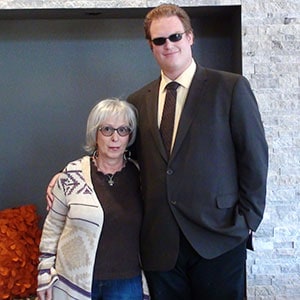
When do our children become adults? And do how we as moms adjust the way we relate to these now-tall people who share our DNA?
There are a lot of people who object to the term “adult children.” So what do we call them to be both sensitive and politically correct? How about simply sons and daughters?
The fact that they are 30 or 40-something can be readily seen. Their connections to us are usually confirmed by anecdotes and memories. They are validated by others who know us through a common history, like teachers or neighbors. Things can get complicated if there’s been any short or long-term conflict.
As a mom, daughter and granddaughter, here’s my take on how to enjoy your adult children after 60.
Take a Step Back and See Them as Separate Individuals
When you’ve shared history with sons and daughters, it’s hard to drop the heavy comment, “Yes, but I’m their mother.” Yeah, we get that. Or perhaps, “They’ll always be my babies.” Notice how they cringe when they hear that phrase? Remember your reaction?

Look at these people as competent adults with their own lives. It does not mean letting go of the love and caring you feel for them. In fact, to give them adult respect is a high form of love and dignity.
Once you’ve adjusted your “Mom-Viewer,” get re-acquainted with them. Treat them like you would any adult you’re getting acquainted with. Pretend that you are catching up with them after a long time.
This may seem silly at first. However, you’d be amazed at how much we moms take for granted about sons and daughters. We assume we know everything because we’re their mothers, right? Why not ask genuine, low-key questions that flow naturally. Say for example, “So, you’re doing well in the new job? How are you unwinding at the end of your day? Because you’re really looking great.”
The key is to show genuine interest, but not fall into any “Mother-Hover” mode. You don’t want your son or daughter to become defensive or irritated. The conversations can build from there. By taking a youthful perspective, you’d be surprised what delightful things you can learn about this person.
It’s a work in progress, though. If you’re not used to this kind of communication, be patient with yourself and practice. You’re probably not going to get it right immediately. For some of my personal experience with this, I invite you to read my post entitled “Adult Conversation” on my blog.
Acknowledge Any Unfinished Business
Dealing with unfinished business will take time and may involve some pain. Our offspring didn’t come with any how-to manual, so a private and honest reflection of what went on might be a good start.
There is no need for self-bashing. Sometimes the support of a qualified counselor can help you sift through past events and explore your feelings and perspectives. That way, you can approach a son or daughter with an empathetic viewpoint. You will be able to clearly hear their side of any unresolved conflict.
The counselor can also teach you some communication techniques to voice your side of any argument, and help you feel that you’ve been heard. Creating a safe space where parents and children can be honest in a loving, respectful way goes a long way to healing old wounds.
Accept that Things Don’t Always Turn Out the Way We Planned
Lots of sitcoms have joked about moms counting on being able to say “my son, the doctor,” or other variations. It takes courage for a son or daughter to realize that what their parents wanted wasn’t something that made them happy. They often feel guilty for letting their parents down. This could involve education, career choices, or relationships that they feared their parents would disapprove of.
In recent years, we also have been made more aware of the issues faced by the LGBT communities and their families. Not being able to support each other as a family through difficult feelings and decisions has resulted in painful, and sometimes tragic, consequences.
What a journey! Look back on your relationship with sons or daughters. Recall their milestones and accomplishments. Appreciate working through the difficult times and finally coming to a point where you see the results of your parenting. Sometimes the feelings are joyous, sometimes painful, but hopefully always with a loving resolution.
What experiences have you had with recognizing your son or daughter as an adult? Were there any difficulties involved in communication, relationships? Have you resolved them, and if so, how? Please join the conversation.





